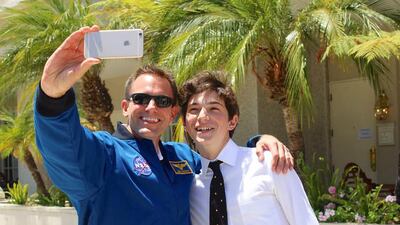ABU DHABI // Applications are now open for The National's Genes in Space competition.
A winner of the US version of the competition has urged all high school pupils with an interest in science to get involved.
“It’s not like any other high school competition. If you win you get a chance to do something you may never be able to do again in your entire life, even as a professional,” said Julian Rubinfien, whose winning DNA experiment will be be sent by rocket to the International Space Station next year.
The 16-year-old became the winner of the second annual Genes in Space contest in the US with his proposal to conduct an experiment to find out why astronauts aged more rapidly in space.
“It’s completely unbelievable and I am still in shock. Even other people tell me, ‘Wait they’re not really sending your project to space are they?’” he said.
The chance to have a science experiment carried out in space was “unreachable” for most pupils, Julian said.
“I can’t think of a reason why you wouldn’t apply,” he said.
After first entering his idea to measure the length of telomeres, the chromosome end-caps that are shortened in premature ageing, as method to study the reason for accelerated ageing in space, Julian said he did not think he had a chance against 900 others.
“I thought an honourable mention would have been nice, but when they called me back to say I was one of the finalists I was incredibly excited.”
After fine-tuning his idea with a mentor from the Massachusetts Institute of Technology, Julian beat the four other finalists. His experiment was announced as the winner at the fifth annual ISS Research and Development Conference in San Diego, California last July, where he got to rub shoulders with astronauts and heads of the space industry.
“It was unbelievable. I learnt so much in the process and am looking forward to discovering even more before the launch,” Julian said.
One UAE student interested in the effects of cosmic radiation on cancer cells said he could not wait to submit his team’s proposal.
“It’s really exciting. We get to study genetics and research microgravity at the same time,” said Pritvik Sinhadc, 12, from the Dubai College.
Aveline Moodley, a science teacher at Alsariya School in Sweihan, said the contest was the perfect event to get her students engaged in the subject.
“Science specifically can be a very abstract field but this gives my students an interesting and tangible challenge,” she said.
With UAE’s population being roughly about one 30th the size of the US, students in the Emirates stand a much greater chance of becoming finalists.
Although he found coming up with an experiment daunting, Julian said he grew more confident as he researched the subjects.
“I learnt how to be creative and innovative. In the end, I thought to myself ‘If you don’t enter you can’t win so why not?’ ”
Pupils in Grades 7 to 12 can now submit their proposals and learn more at www.genesinspace.org/contest-uae.
To find out more and get involved, follow #genesinspaceuae on social media.
tsubaihi@thenational.ae

